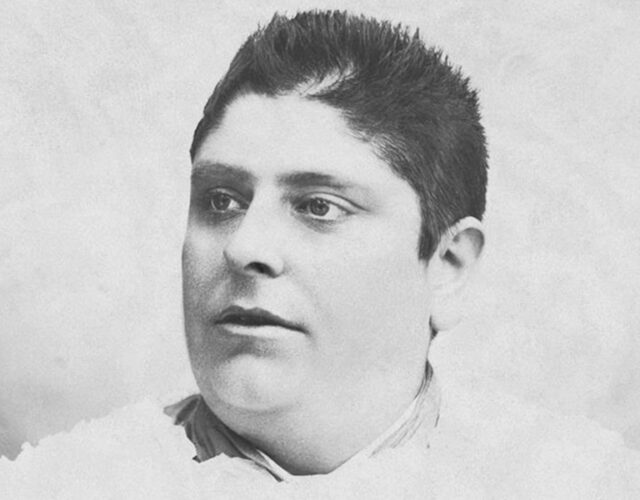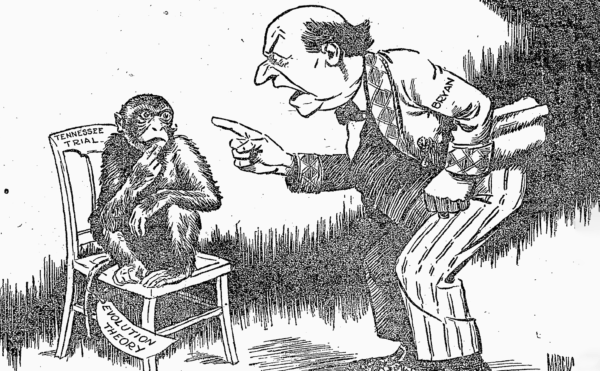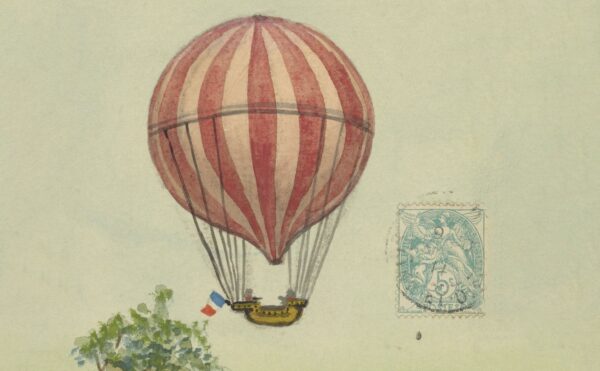In this episode of The Disappearing Spoon, Sam Kean talks about Alessandro Moreschi, the so-called “Angel of Rome.” His voice earned him fame and money. So what’s the secret behind the voice? What was his trick? It turns out that his trick can also make you taller and prevent baldness. The only catch: it requires castration.
Credits
Host: Sam Kean
Senior Producer: Mariel Carr
Producer: Rigoberto Hernandez
Audio Engineer: Jonathan Pfeffer
Transcript
That, of course, is the Ave Maria, one of the most famous songs of all time. But believe it or not, that’s not a woman singing there. That’s a man.
His name is Alessandro Moreschi, the so-called Angel of Rome. He’s an Italian singer who recorded this track on a wax cylinder in 1904.
That’s not falsetto, either. That’s Moreschi’s natural signing voice. Keep in mind, too, that this was crude recording equipment. In person, he would have sounded much better.
So how did Moreschi get a voice like that? What was his trick? Well, what if I told you that this same trick can also make you taller, and will extend your lifespan? It prevents baldness, too, and can make you rich and famous. Pretty good deal, right?
There’s just one catch—that this trick is pretty drastic. Moreschi could sing like that because he was a castrati. That is to say, the Angel of Rome owed everything in his life, good and bad, to the fact that he’d been castrated.
For centuries and centuries, women were banned from signing in Catholic churches. But choirs still needed sopranos for some songs. So they trained little boys to hit the high notes.
The only problem was, little boys don’t stay little boys. They shoot up into oily, smelly teenagers, and when they do so, their voices get deeper. This change drove choirmasters bonkers. They’d spend years training some little fellow, molding and crafting his singing—and the week before a big Christmas concert, his voice would start cracking. It was horribly frustrating.
So, someone—we don’t know who—came up with a dastardly solution: just castrate the boys. Without testicles, these so-called castrati would not go through puberty. As a result, their voices would remain high-pitched and pure.
The demand for castrati singers began in the 1500s in Italy and accelerated over the next few centuries. As for the castration itself, historians don’t know how exactly surgeons performed the operation, but we can hazard some guesses.
First, surgeons probably soaked the boys in a warm bath, to soften up their tissues. Next, they knocked the boys out with opium, or else squeezed their necks until they passed out.
From there, the surgeons had two choices. They could cut out the testicles completely. Or, more safely, they could simply snip the blood vessels that supplied the testes with nourishment. After that, the testes withered away naturally. Either way, no puberty.
Now technically, the Catholic Church banned castrations pretty early on. And surgeons faced severe punishments if they were caught performing the operation. So people took to lying about it. Whenever castrati boys showed up for choir practice, they always had some cockamamie excuse about, say, falling off a horse or a hunting accident. A few claimed that wild pigs or even wild geese had attacked them and gobbled their testicles up.
But despite the ban on castration, churches happily—if hypocritically—accepted the castrati for choirs. Church officials reasoned that, yes, individual boys might suffer, but their beautiful voices promoted the greater glory of God.
Still, you might be wondering: why on earth would parents allow this to happen to their children? In a word, money. Families in Italy were often huge back then, especially on farms. A dozen children was not uncommon. Parents simply could not feed them all, and were relieved to send them to a choir in the big city and let the church raise them instead.
And even if the boys couldn’t hack it as singers, joining the choir earned them lifelong benefits. If they dropped out, Churches would quietly ordain them as priests when they grew older and give them decent jobs. It sure beat starving on the farm. So many desperate parents willingly castrated their little boys.
As a result, back-alley castrations flourished. By the mid-1700s, thousands of boys were getting snipped in Italy every single year.
After the operation, the boys underwent a grueling ten-year apprenticeship during their teenager years to train their voices. Once they were adults, most joined church choirs.
Others, however, took a different path and joined the opera. Composers like Mozart wrote opera roles specifically for castrati. Castrati were in fact perfect for those Shakespeare-like roles where female characters were disguised as men for half the plot.
Every historical account of the castrati mentions how stunning they sounded. Orchestras would sometimes stop dead in the middle of a song—so dumbstruck at the singer onstage that they forgot to play their instruments.
Along those same lines, during a war between Poland and Sweden once, the soldiers actually stopped fighting—just stopped—simply to give one famous castrato safe passage from one country to the other for a concert he was giving. To be sure, the two sides hated each other. But they could not deny even their greatest enemy the pleasure of hearing such an angelic voice.
Still, while most accounts of the castrati emphasize their incredible singing, there were of course medical and psychological effects, too. And to truly understand the lives of castrati, we need to take those medical and psychological effects into account.
It was actually easy to recognize a castrato. For one thing, they were unusually tall as adults. That might sound strange, since we usually associate puberty with a growth spurt. But that’s not the whole story.
During puberty, testosterone and related hormones do kick growth into high gear. Leg and arm bones get longer, the ribcage expands, and so on.
But testosterone has another effect as well. Around age 18, testosterone fuses shut the so-called growth plates in our arms and legs. Those growth plates are where we gain most of our height and length. And when they’re fused shut, we stop growing. So overall, testosterone kicks growth into high gear early in puberty—but also ends growth abruptly when puberty finishes.
Something different happened in castrati. They lacked testosterone, so their growth was slower early on. But the lack of testosterone also meant that the growth plates in their legs did not fuse shut. As a result, they kept growing and growing and growing. Many stood six-foot-three or taller as adults—giants back in the 1700s.
Height wasn’t the only medical symptom of castration. Castrati tended to pack extra fat onto their buttocks. Some also developed breasts and osteoporosis. But, on the plus side, elevated testosterone increases your chances of going bald, so castrati rarely lost their hair. They also had baby faces, perfectly smooth and without wrinkles. Best of all, testosterone in mammals is strongly associated with dying younger. So most castrati enjoyed long lives.
And of course, castration also preserved a child-like voice. During puberty men develop cartilage near their voice box, which gives them an Adam’s apple. Castrati therefore had no Adam’s apples.
Testosterone also deepens the male voice by thickening and lengthening the vocal cords. Most boys have vocal cords around 13 millimeters long, half an inch. Adult men have vocal cords around 20 millimeters long, eight-tenths of an inch. That’s 50 percent longer, and the result is a deeper voice.
But without testosterone, the castrati kept their little-boy vocal cords. People meeting them for the first time were often startled to shake hands with a giant—yet hear a pipsqueak voice.
And high-pitched voices weren’t all. What really made castrati special was the chest. Just like with their legs and arms, their ribcages kept growing and growing in adulthood. This gave them cavernous chests, which could hold more air for singing. Some castrati could hold a note for a whole minute at full volume. Just try that sometime.
Other castrati had a range of three-and-a-half octaves. Even talented falsetto singers could never match that. And beyond that, falsetto sounds pinched and weak in comparison to the full-chested resonance of the castrati. Their voices were truly otherworldly, truly angelic.
As a result, many castrati were legends in their own time—the first true international singing stars. Top performers could earn the modern equivalent of a million dollars in a single opera season. Some historians compare them to Michael Jackson—both for their gigantic celebrity, and their androgynous look. Even second-rate castrati often ended up rich and powerful, hobnobbing with popes and dukes and queens.
Still, there is one more medical symptom we should address—one that also has a deep psychological component. In short, castration usually leaves men impotent. This eliminates the possibility of traditional, penis-in-orifice sex. Castration tends to wipe out your sex drive, too.
Because of this impotence, people mocked the castrati all the time. Some insulted them as “not real men.” They were, quote, “all mouth and no trousers.” It was a deep psychological cut. However as much as castrati were worshipped onstage, they were scorned the moment they stepped off.
But at least in some cases, castrati had the last laugh—because a few of them had more adult fun than you might imagine. Now, this is a controversial area—historians argue about this. But at least some castrati were apparently capable of having affairs. Lots of affairs.
So how was that possible, considering the impotence? Well, given the crude state of medicine back then, not all castrations were complete or completely effective. Bits of testicular tissue might remain behind. Plus, certain cells outside the testes can also produce testosterone. So with some castrati, there might have been enough cells to power an erection and rev up their sex drive.
And frankly, many women—and some men—threw themselves at castrati. I mean, why not? The castrati had adorable baby-faces. They never went bald, and were rich and famous singers, like rock stars today. And for women at least, an affair with a castrato was safe. No chance of getting pregnant. So, many of them ended up bedding the wives of the very men who mocked them.
After centuries of glory, however, the castrati began to decline in the 1800s. There were several reasons why. The economy of Europe improved, so there was less incentive to send young boys away from home. Families grew smaller as well, and the power of the Church declined. Musical tastes changed, too. Opera composers like Wagner found the castrati old-fashioned and artificial, and stopped writing roles for them.
Plus, people were frankly embarrassed. The 1800s felt modern, a time of science and industry. And chopping off young boys’ testicles to amuse the upper classes seemed a bit feudal, even barbaric. So, the practice waned.
Now, even though the practice died out in Italy, it held on in other places—especially China. There, eunuchs had served the Chinese emperor for thousands of years, dating back to the days of the Roman Empire.
These Chinese eunuchs were not singers, but they held incredible power in China—more than the emperor sometimes. And believe it or not, the last Chinese eunuch didn’t die until 1996! He once walked the Earth with you and me. You can hear his amazing tale in a bonus episode at patreon.com/disappearingspoon. That’s patreon.com/disappearingspoon.
Overall, though, by the late 1800s, castrati singers in Europe were going extinct. In fact, the very last castrati singer was the man we heard at the top of the show, Alessandro Moreschi.
Moreschi was born in 1858 and was castrated at age seven, when his parents claimed he needed a hernia operation. Lucky for him, he loved music, and thrived in the choir. He sang in the Sistine Chapel choir for thirty years.
Between his lovely voice, and his notoriety as the last castrato, Moreschi grew immensely rich and famous during his lifetime. Friends recall piles of jewels just lying around his home. And he would strut around Rome like a peacock in outlandish clothing, a white scarf fluttering behind. He also married at one point, and had at least one homosexual affair.
But everything came crashing down in 1903. A new pope took over, Pius X. And Pius found the castrati revolting—not to mention a throwback to the bad old days of the corrupt Church. Pius therefore banned castrati from singing in the Vatican. Moreschi spent his last two lonely decades as a choir director—helping others sing, but never allowed to sing himself. He died of tuberculosis in 1922.
Still, the legend of Moreschi lives on. As one witness said, when Moreschi was at his peak, quote, “his voice rose above the choir in a crescendo [and] overpowered [them] as completely as a searchlight outshines a little candle.” There’s simply no equivalent among singers today. It’s an echo from a lost time.
One writer once mused what it must have been like to be Moreschi—both loved and scorned. The writer then compared him to the last dodo, the last mastodon—a fantastical creature from a vanished world.
But unlike the dodo or mastodon, Moreschi was self-aware. He knew he was a relic, knew he was the last of his kind. What must have been going through his head as he lay dying? Had his castration been worth the fame? The money? Just for that transcendent voice?
Most of us today would say no—no way. But people back then reckoned things differently—there were millions of celibate priests and nuns, too, so sacrificing sex for god wasn’t that unusual. And Moreschi certainly didn’t consider himself less of a man after his operation. Despite what other people saw, he lived his life to the fullest. He also adored music, and he reached a peak of artistic achievement most of us can only dream of. So to him, maybe it had been worth it.
And honestly, when I hear him hit those highest, purest notes—when the spotlight of his voice is at full blaze—there’s a tiny part of me that thinks maybe it was as well.




